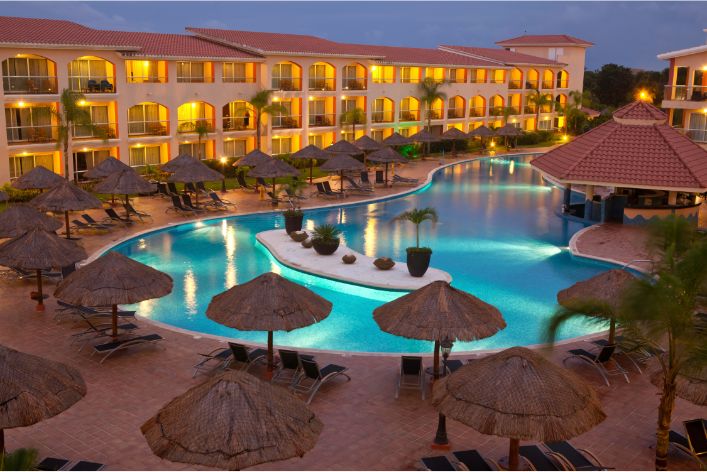Vacant land has been a critical resource for entrepreneurs who have built business empires. It represents an opportunity to create something new, a canvas on which to paint a vision. Vacant land is a blank slate that can be transformed into a thriving business if the right strategies are employed. This post will explore success stories of business empires built on vacant land and the lessons learned from these ventures.

One cannot overstate the importance of vacant land in business ventures. Vacant land represents an opportunity for entrepreneurs to create something unique, innovative, and profitable. Entrepreneurs leveraged vacant land to create successful businesses, as seen in the examples of The Ritz-Carlton, Walt Disney World, and The Venetian Hotel, which became business empires.
The purpose of this post is to examine these examples and highlight the strategies, lessons learned, challenges, and risks associated with building a business empire on vacant land. Entrepreneurs can gain valuable insights and knowledge from the experiences of successful businesses that started from nothing.
In the following sections, we will delve into the stories of these successful businesses and the strategies that they used to turn vacant land into profitable enterprises. We will also explore the lessons that can be learned from these ventures and the challenges and risks that entrepreneurs may face when embarking on a similar journey. By the end of this post, readers will have a deeper understanding of the importance of vacant land in business ventures and how it can be leveraged to achieve success.
Successful Examples of Business Empires Built on Vacant Land
Vacant land has been the starting point for several successful business empires. Here are three examples of businesses that turned vacant land into thriving enterprises:
A. Example 1: The Ritz-Carlton

- History and origin
The Ritz-Carlton hotel chain was founded in 1983 by William B. Johnson. Johnson was a former president of Holiday Inn who had a vision of creating a luxury hotel brand that would compete with the best in the world. - The role of vacant land in the hotel’s success
The first Ritz-Carlton hotel was built on 18 acres of vacant land in Atlanta, Georgia. The land had been unused for over a decade, and Johnson saw an opportunity to transform it into a world-class hotel. - Key strategies used in developing the hotel
To make the hotel a success, Johnson focused on providing exceptional customer service and creating a luxurious experience for guests. He also invested heavily in training and development for employees, ensuring that they were equipped to provide top-notch service to guests.
B. Example 2: Walt Disney World

- History and origin
Walt Disney World was the brainchild of Walt Disney, who had already achieved success with Disneyland in California. In the 1960s, Disney began looking for a location to build a larger theme park in Florida. - How the company acquired the land
Disney was able to acquire 27,000 acres of vacant land in central Florida, an area that was mostly swamp and farmland at the time. Disney used shell companies to make the land purchases to avoid raising the price of the land. - Key strategies used in developing the park
Disney invested heavily in research and development to create a theme park that would be unlike anything else in the world. He also focused on creating an immersive experience for guests, with attention to detail and theming in every aspect of the park.
C. Example 3: The Venetian Hotel

- History and origin
The Venetian Hotel in Las Vegas was opened in 1999 by Sheldon Adelson, the founder of the Las Vegas Sands Corporation. Adelson had a vision of creating a luxury hotel and casino that would stand out in the crowded Las Vegas market. - The role of vacant land in the hotel’s success
The Venetian was built on the site of the former Sands Hotel and Casino, which had been demolished. The vacant land provided Adelson with an opportunity to create something new and innovative in the heart of the Las Vegas strip. - Key strategies used in developing the hotel
Adelson focused on providing guests with a luxurious experience, with attention to detail in every aspect of the hotel. He also invested in entertainment options and marketing to draw guests to the hotel and create a unique experience.
These three examples illustrate the power of vacant land in building successful business empires. By leveraging the opportunities presented by vacant land, entrepreneurs can create something new and unique that stands out in the market.
However, building a business empire on vacant land is not without its challenges and risks. In the next section, we will explore some of the lessons learned from these successful ventures, as well as the challenges and risks that entrepreneurs may face when building a business on vacant land.
Read: Real Estate Marketing: Everything You Need To Know
Lessons Learned
Building a successful business empire on vacant land requires a combination of vision, calculated risks, partnerships, innovation, and team-building. Here are some of the lessons learned from the successful examples of businesses built on vacant land:
A. Importance of vision
- Having a clear and compelling vision is essential to building a successful business on vacant land.
- A vision provides direction and purpose, helping entrepreneurs to stay focused on their goals and make strategic decisions.
- The vision should be inspiring, compelling, and communicated effectively to stakeholders.
B. Taking calculated risks
- Building a business empire on vacant land requires taking calculated risks.
- Entrepreneurs must be willing to invest time, money, and resources in their vision.
- Risks should be assessed carefully, and entrepreneurs should have contingency plans in place.
C. Leveraging partnerships and resources
- Successful business empires are often built through partnerships and collaborations.
- Entrepreneurs should leverage the resources and expertise of others to achieve their vision.
- Strategic partnerships can help entrepreneurs access financing, expertise, and networks.
D. Continuous innovation
- Building a successful business empire on vacant land requires continuous innovation.
- Entrepreneurs should constantly be looking for ways to improve their products, services, and operations.
- Innovation helps businesses stay competitive, adapt to changes in the market, and maintain a strong position.
E. Building a team
- Building a successful business empire on vacant land requires a strong and committed team.
- Entrepreneurs should invest in recruiting, training, and developing their team members.
- The team should be aligned with the vision and values of the business and share a commitment to achieving the goals.
These lessons learned are crucial for entrepreneurs looking to build a successful business empire on vacant land. However, building a business on vacant land is not without its challenges and risks. In the next section, we will explore some of the challenges and risks associated with building a business empire on vacant land.
Read: Hotel Real Estate: Analyzing Location Factors
Challenges and Risks
Building a business empire on vacant land can be a challenging and risky endeavor. Here are some of the challenges and risks that entrepreneurs may face when building a business on vacant land:
A. Environmental and legal issues
- Building on vacant land may require permits, zoning changes, and environmental assessments.
- Environmental issues such as soil contamination or endangered species can delay or even halt a project.
- Legal issues such as property disputes or zoning violations can result in costly litigation.
B. Financial risks
- Building a business empire on vacant land requires significant financial investment.
- Entrepreneurs may need to secure financing from banks, investors, or other sources.
- There is always a risk that the business will not generate enough revenue to cover the costs.
C. Market fluctuations
- The market for a particular business may be unpredictable and subject to fluctuations.
- Entrepreneurs need to be aware of market trends and adjust their strategies accordingly.
- Economic downturns, changes in consumer behavior, and increased competition can all impact the success of a business.
These challenges and risks highlight the importance of careful planning, risk assessment, and contingency planning when building a business empire on vacant land. Entrepreneurs need to be aware of the potential challenges and risks and have plans in place to address them.
Despite the challenges and risks, building a business empire on vacant land can be a rewarding and profitable venture. In the next section, we will summarize the key points of this post and provide some final thoughts and recommendations for aspiring entrepreneurs.
Read: Real Estate Trends: Why Boutique Hotels are Booming
Conclusion
This post has explored the success stories of business empires built on vacant land, including The Ritz-Carlton, Walt Disney World, and The Venetian Hotel. These examples illustrate the importance of vision, calculated risks, partnerships, innovation, and team-building in building a successful business on vacant land.
However, building a business empire on vacant land is not without its challenges and risks, including environmental and legal issues, financial risks, and market fluctuations. Entrepreneurs must be aware of these challenges and have plans in place to address them.
Budding entrepreneurs can learn valuable lessons from these successful ventures, including the importance of having a clear and inspiring vision, taking calculated risks, leveraging partnerships and resources, focusing on continuous innovation, and building a strong and committed team.
Implications for aspiring entrepreneurs
Entrepreneurs looking to build a business empire on vacant land should keep the following in mind:
- Have a clear and inspiring vision for the business.
- Take calculated risks and have contingency plans in place.
- Leverage partnerships and resources to achieve the vision.
- Focus on continuous innovation to stay competitive.
- Build a strong and committed team aligned with the vision and values of the business.
Final thoughts and recommendations
Building a business empire on vacant land can be a challenging and risky endeavor, but with careful planning and execution, it can also be a rewarding and profitable venture. Aspiring entrepreneurs should research the market, assess the risks, and develop a comprehensive plan before embarking on such a journey. With dedication, perseverance, and a little bit of luck, they can transform vacant land into a thriving business empire.
Read: Repurposing Commercial Real Estate as Hotels
Before You Go…
Hey, thank you for reading this blog to the end. I hope it was helpful. Let me tell you a little bit about Nicholas Idoko Technologies. We help businesses and companies build an online presence by developing web, mobile, desktop, and blockchain applications.
We also help aspiring software developers and programmers learn the skills they need to have a successful career. Take your first step to becoming a programming boss by joining our Learn To Code academy today!
Be sure to contact us if you need more information or have any questions! We are readily available.
[E-Books for Sale]
1,500 AI Applications for Next-Level Growth: Unleash the Potential for Wealth and Innovation
$5.38 • 1,500 AI Applications • 228 pages
Are you ready to tap into the power of Artificial Intelligence without the tech jargon and endless guesswork? This definitive e-book unlocks 1,500 real-world AI strategies that can help you.
See All 1,500 AI Applications of this E-Book
750 Lucrative Business Ideas: Your Ultimate Guide to Thriving in the U.S. Market
$49 • 750 Business Ideas • 109 pages
Unlock 750 profitable business ideas to transform your future. Discover the ultimate guide for aspiring entrepreneurs today!
See All 750 Business Ideas of this E-Book
500 Cutting-Edge Tech Startup Ideas for 2024 & 2025: Innovate, Create, Dominate
$19.99 • 500 Tech Startup Ideas • 62 pages
Put Your Tech Company on the Map!
Get featured on Nicholas Idoko’s Blog for just $50. Showcase your business, boost credibility, and reach a growing audience eager for tech solutions.
Publish NowYou will get inspired with 500 innovative tech startup ideas for 2024 and 2025, complete with concise descriptions to help you kickstart your entrepreneurial journey in AI, Blockchain, IoT, Fintech, and AR/VR.
We Design & Develop Websites, Android & iOS Apps
Looking to transform your digital presence? We specialize in creating stunning websites and powerful mobile apps for Android and iOS. Let us bring your vision to life with innovative, tailored solutions!
Get Started Today



